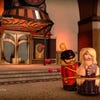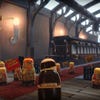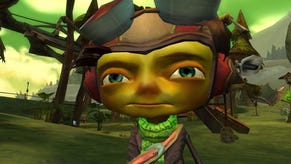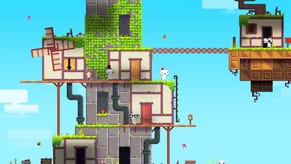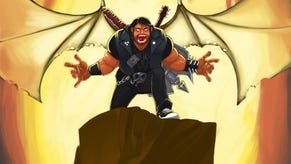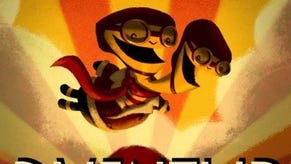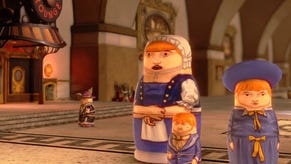Stacking: "Farts and Chopin"
Double Fine's Lee Petty and Tim Schafer.
Contrary to popular belief, game developers like Double Fine do not live in ivory towers surrounded by moats of blood, snorting the crushed bones of children through your hard-earned £10 notes. Not since they've left Activision, anyway. (Too much?)
But today we're meeting Tim Schafer and Lee Petty in the penthouse apartment of a swish hotel in New York City (so swish, in fact, that they ask camera crews not to name it, and swish enough that you can unplug the cable box from the TV and hook up your Super Nintendo if you get bored on Friday after dinner, as I did). Schafer and Petty are expected to ram about 408 interviews into a two-hour period, so we only get five minutes, but it's an enjoyable exchange so we thought you'd like to see it in full.
Petty is lead designer on Stacking, due out for PSN and XBLA this week. While Schafer isn't working on it much (although he assisted with story-writing and some puzzles), he does a reasonable job demoing it on stage at THQ's Gamer's Week event, and of course he's Tim Schafer, so it's always nice to see him.
Check out our Stacking review to find out why it was one of our staff picks for 2011.
Yeah, it was great. We weren't originally planning to be up on that stage, but he brought us up and it think it says a lot that they're supporting our creative vision for the game and not trying to impose any creative restraint and weird focus-group test thing on us.
Nothing that we have... There's... I don't know. [Laughs]
I think it would be great to continue this collaboration in future, personally.
Yes, we really hope they call us.
We're expecting money hats to arrive in the mail any day.
I don't know if I approach it that way. I guess when you're making something work, you're like, 'What could be done here that's, just, interesting and entertaining?' And maybe just humour is the first we trick we use to make things interesting and entertaining.
There's always the artifice of the game. There's always a little bit of that breaking the fourth wall when you're working on a game. And a lot of the humour comes from breaking that. Like, there's a guard at the door, and it's a gating device, and you're like, 'Well that's boring, I've seen that before,' then the guard's got his own comedic story about why he's there standing at the gate.
That's the nature of the game. So to some extent I think it's just reacting to some of the trappings of working on the game. It just leads to those comments. You hear those comments a lot when people are working on games, but you don't really see them in games, and they feel really good to me.





